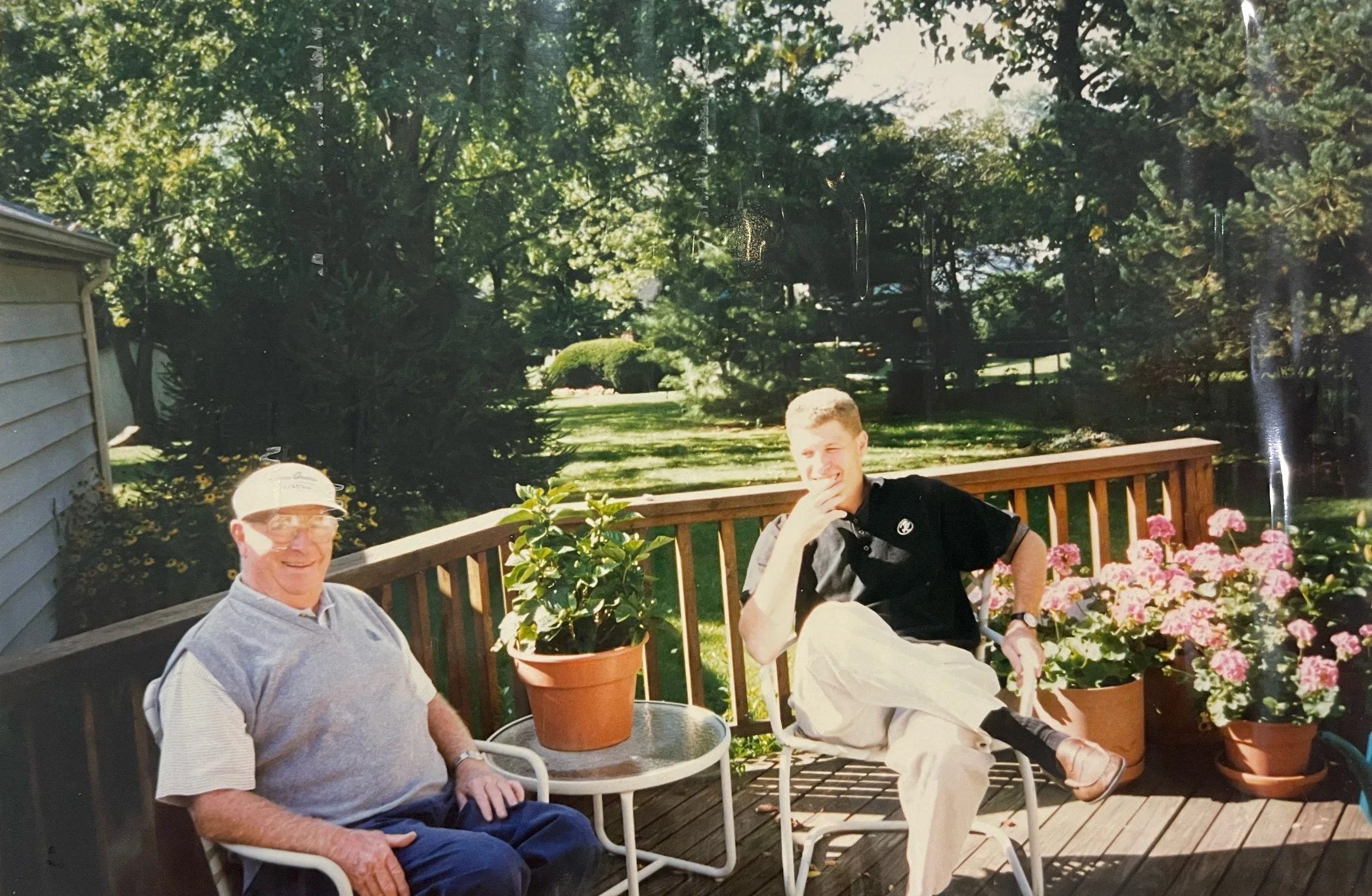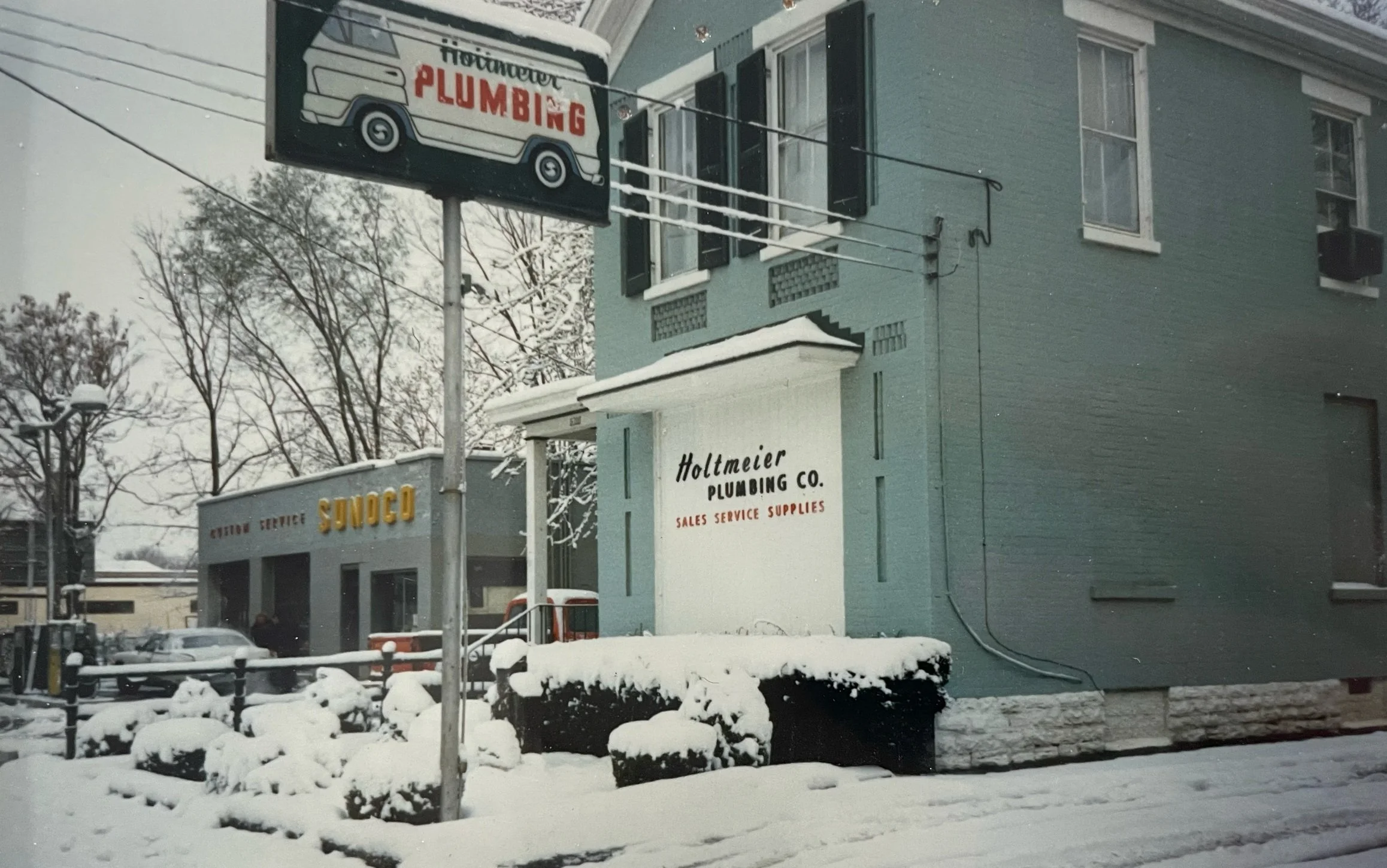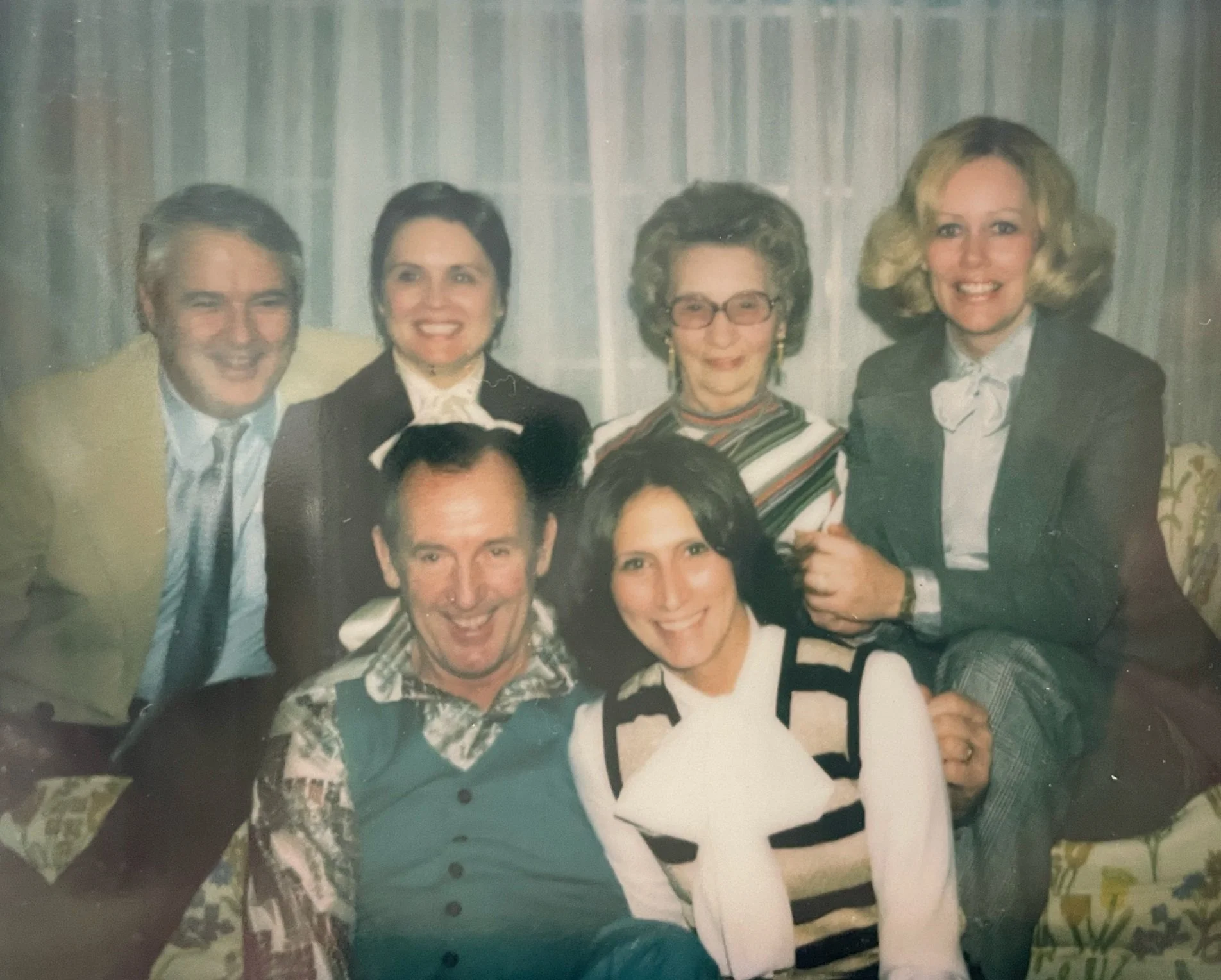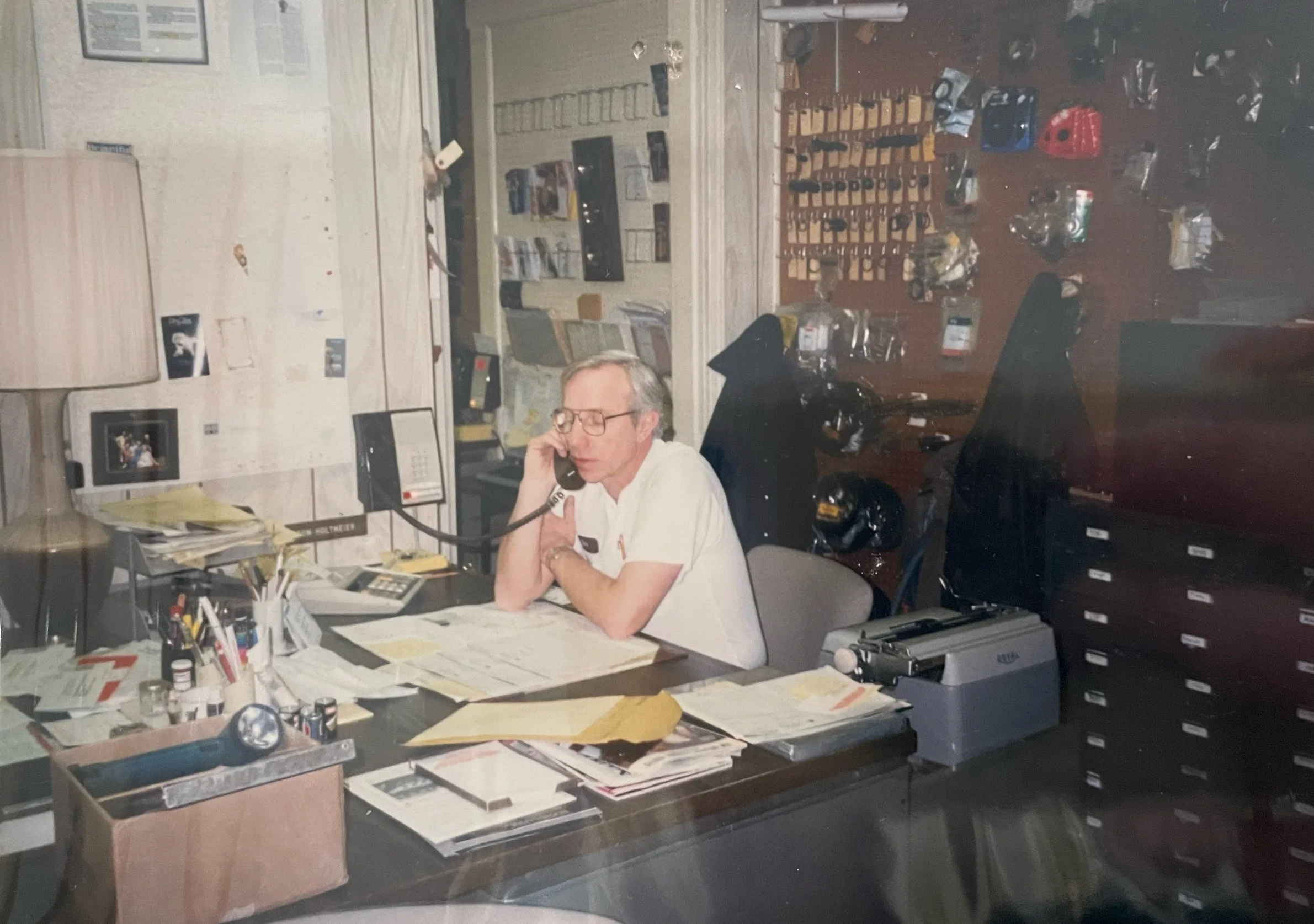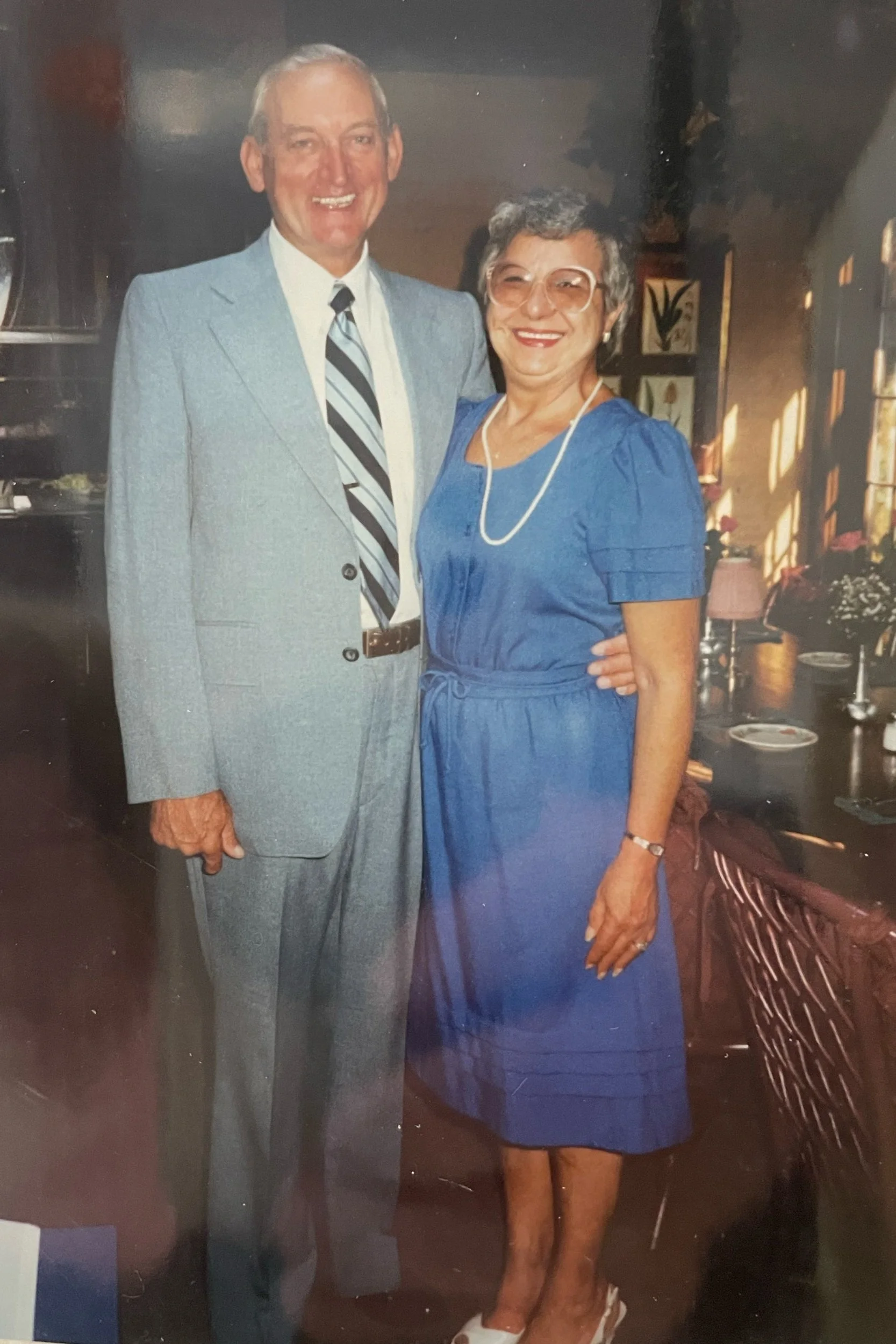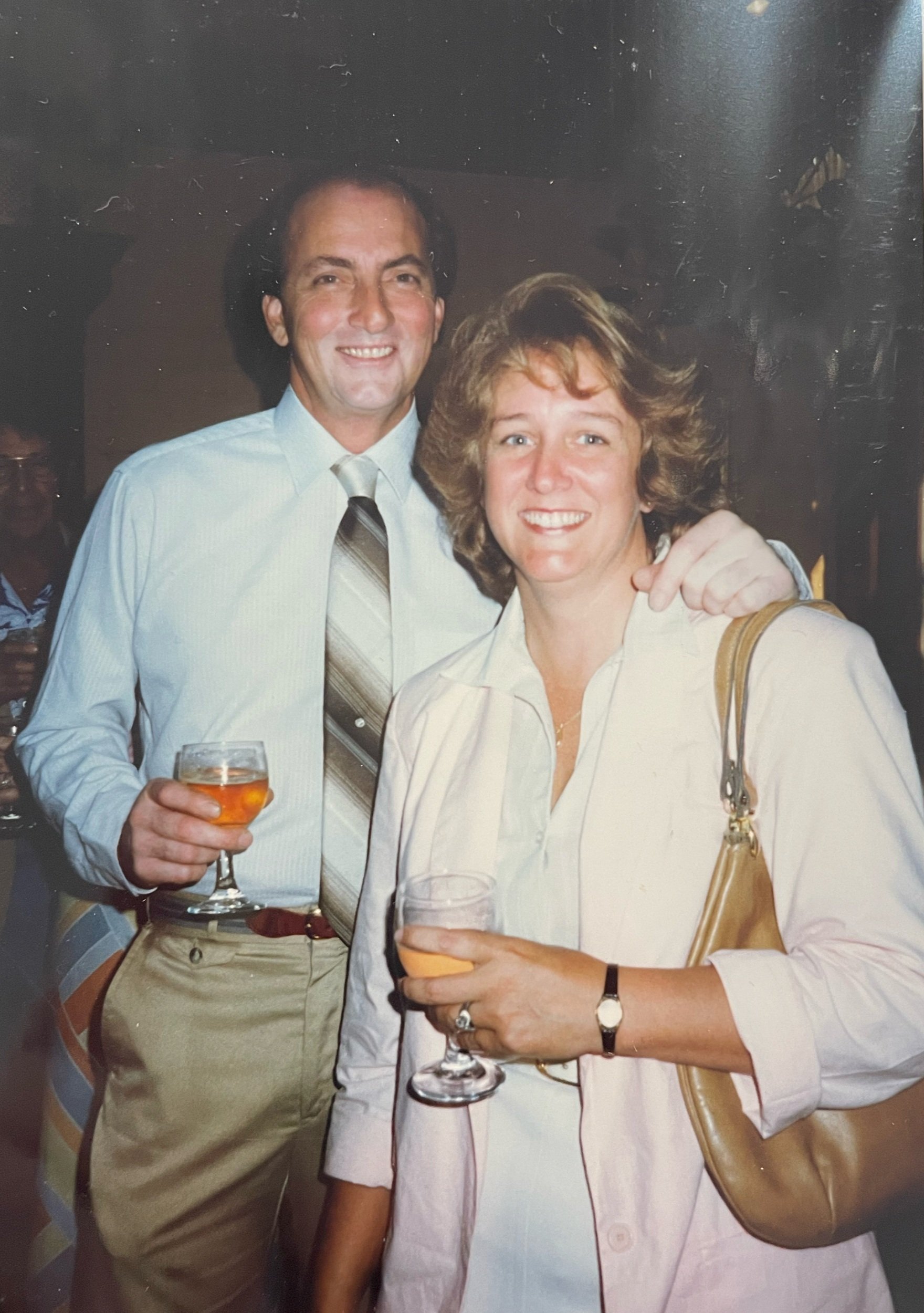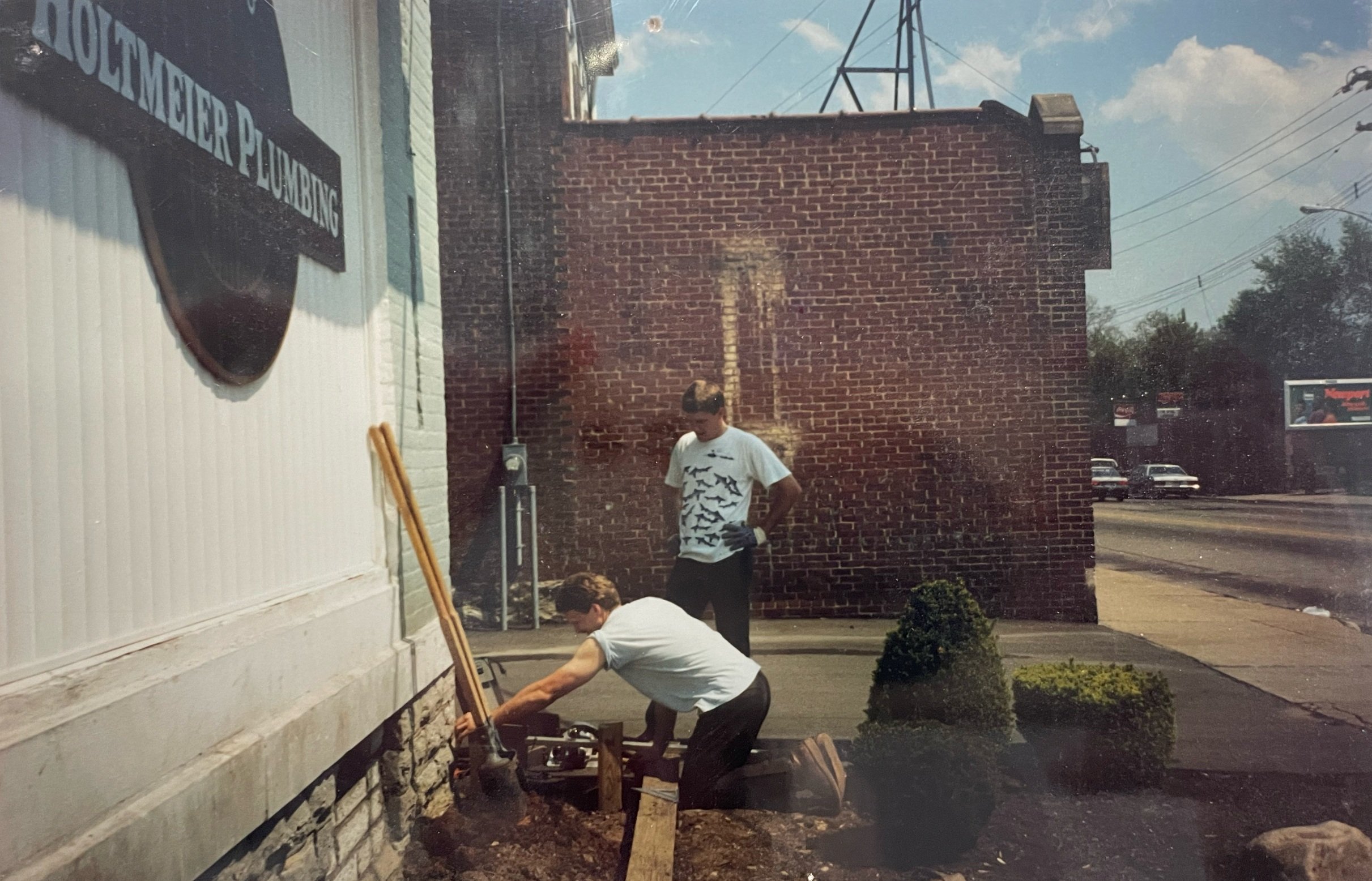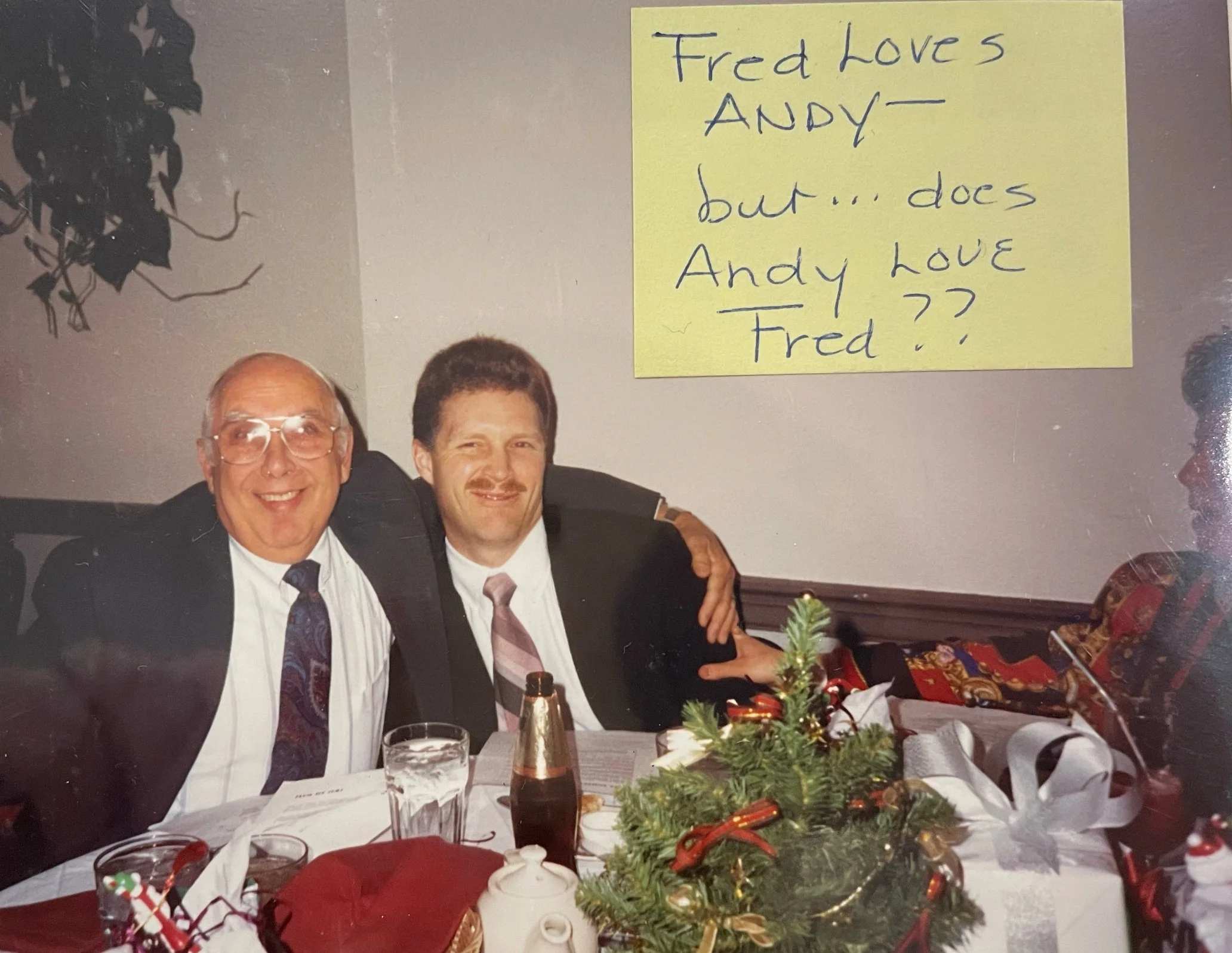History
Ah, the 1930s in America…the era of Art Deco, big band, small hats, and a nation full of resourceful people who made it work during hard times. In 1938, plumber Tony Holtmeier struck out on his own, creating a business that would thrive across generations.
The following history was written by Don Holtmeier, son of founder Tony Holtmeier.
-
Anthony F. Holtmeier (“Dad”) was born February 14, 1896 in Cincinnati, Ohio. He was the youngest of six boys and four girls. Their home was at 2715 Alice Street in the Clifton neighborhood, surrounded by the University of Cincinnati. All the children attended St. George church and school. Dad probably finished grade school about 1910 or 1911 at age 14.
At that time, not many children went to high school as we know it today. Some attended trade schools or business schools, but most went to work as apprentices for tradesmen. Some who worked might attend classes at night schools, and I think Dad did this at East Night High, now known as Hughes High School located on Clifton Avenue, within walking distance of his home. Dad was fairly good at figures and writing. He had very nice penmanship and a good grasp of business and investing. He was a good speaker and handled himself well in front of people.
He and his brothers were all good basketball and baseball players and competed throughout the city. Dad was best at baseball and played as high as Semi Pro on Sundays, sometimes at Crosley Field, which was the home field of the Cincinnati Reds in the Professional National League.
-
Dad started as a Plumber Apprentice in 1912 for George Schmeig Plumbing Company in Norwood, where he learned Plumbing, Heating, Gas Fitting, Pipefitting, Refrigeration, and maybe other things. He once told me that, as the newest employee, one of his duties was to get beer for everybody at lunch time. He would have a stick with notches cut into it and these would keep the several cans from sliding off. Sometimes there would be as many as ten cans on the stick.
In 1917, he joined the U.S. Army to fight in World War 1, the “war to end all wars.” He stayed in the Army until the war ended in 1918. While in the Army he did some boxing for his Regiment, and served in France for some time. He returned to Cincinnati after his tour and went back to the Plumbing business with Schmeig Company. At this time he was about 23 years old.
According to a Cincinnati census from 1924, Dad was listed as a plumber, so somewhere in that time period he passed a test to become a journeyman plumber. I remember that he was a union member belonging to Local 59 around this time. I also remember him talking about traveling to Kentucky and Tennessee to install ice machines, but I don't remember who he worked for then. When he worked out of the Union Hall, plumbers were not allowed to drive their own cars to the job, as this was considered unfair to those who did not own a car, so they all took public transportation such as horse drawn streetcars to the job.
-
Dad married Remilda C. Dulle in 1923 and moved to 5719 Adelphi Street in Madisonville, living on the second floor of a two-family house owned by Anthony and Gertrude Bokenkotter, who became lifelong friends. Madisonville was way out in the country at that time and all their families probably thought they were a little crazy.
Their first child, Betty, was born in this apartment and it became too small so they bought a house on Homer Avenue near Bramble Avenue (which was razed in 1965 to build a school) and their second child, Don, was born in this house in 1926. The village of Mariemont was being built from 1923 on, and I am sure Dad worked on those buildings during the construction, probably out of the Union Hall. He also worked for John Baes Plumbing and John Muller Plumbing Company. In 1928 or early 1929 he sold the house on Homer Avenue and moved into one of those apartments in Mariemont, while he was building a house at 5525 Islington Avenue in a newly developed neighborhood, subdivided from a farm owned by William Howell. He did a lot of the work on this house himself and hired a George Hensgen as the major constructor, hiring other sub contractors for things like roof, tile, electric etc.
Building a house in 1929 was a rather precarious adventure for anyone because the whole world was in a recession which would become "The Great Depression" of the 1930s. Their third child, June Ann, was born in this new house on June 30, 1930.
-
Soon all industry and business stopped and many people became unemployed including Dad, but it seemed he was always able to find something to do. He worked as a salesman for Sands Water Heater Company and Williamson Heater Company, a detective at a hotel in Cincinnati, and also did some "moonlighting" in the plumbing field. I'm sure Mom and Dad thought they might lose their new house to the bank, but the government installed controls to prevent this from happening as long as you could pay some interest to the lenders.
In 1931, the Government started programs to get people back to work. These included CCC and WPA projects which dealt mostly with road, bridge, and park construction, and the Green Belt projects which concentrated on new house and building construction. Dad went to work with most other unemployed plumbers in this area at Green Hills in northern Cincinnati, where he stayed from 1931 to 1936 when it was completed. By this time, with everyone working and buying, the economy was again in good shape. I'm not sure who Dad went to work for after Green Hills but I think he did some installing for Sears and Roebuck and some other retailers.
-
In 1934, Tom Holtmeier was born, which made it two and two. Jerry would come along in 1944 to complete the family. Since moving to Madisonville in 1923, the family always belonged to St. Margaret of Cortona Church, where all the kids went to school. Dad continued to play baseball with several teams, notably with St. Margaret teams which were most times the best in the church leagues. Both Mom and Dad were devout members of the Holy Name Society for men and The Ladies Altar Society. The annual Festival on the church grounds was an event we all looked forward to each year. Dad also coached Knothole Baseball and had some very good teams in the Hamilton County area. He was also a Scout Leader for the Church Troop #133.
-
After Green Hills was finished, many of the people who worked there went into business. Dad did too. In August 1938 he opened his business from his home on Islington Avenue, with himself as the only employee. Mother would answer the phone with the office being in the dining room. I don't know how he got customers, but probably from his contacts in the church or sports. Anyhow, he was on his way. Dad was a very good plumber, honest and fair, and this is what made him so successful. Soon business was so good he needed someone to help him, so he hired Frank Woods as an apprentice, which worked out well. Frank had not finished high school yet, so Dad insisted he do this along with going to apprenticeship classes. Frank learned well and progressed rapidly, helping Dad grow his new business.
At first Dad used his family car, a 1937 Chevrolet sedan, as his work vehicle. Soon he bought a used 1936 Chevrolet Canopy Express, which was called a “vegetable truck.” Dad was sure proud of this addition. I'm sorry our family never took many pictures because it would be great to have some of this car. As with anything that is going to be successful, the house shop became too crowded, so he rented a store at 6304 Madison Road, which had an office in front and back room storage, along with a basement, but no garages or other storage space. The toilet was down the hall, which was shared with other tenants.
-
Business was picking up rapidly now, as several other plumbers in Madisonville were closing up their shops. Dad bought some of Bert Hodgson and John Baess' stock along with another truck. But the best thing he got was Bill Kent from Hodgson Company. Dad always wanted to establish a strong repair business and Bill was a superb person in that field. Along with Bill came his fully equipped truck, so all he had to do was just work out of a different location now. He even had an extra garage where he lived to keep it in. What a stroke of luck. Dad was still doing some new work and he had several plumbers along with several helper laborers to do this. There were Johnny Clemons, Harry Timmerman, Naaman Settles, Frank Woods, George Beckler, Herman Wilmers, and others I can't recall. Some of the builders Dad did work for were Dugan and Meyers and Gene Maxfield, who kept Dad pretty busy. Mother, along with Betty, kept the books and records at Islington Avenue, besides answering the phone. Things were humming right along.
In 1942 the present building at 6310 Madison Road became available. Because of Mother’s business ability and foresight in real estate, they bought it for $3,500. Immediately they built three garages, along with a blacktop driveway. They used the front room as the main office, with the center and rear room devoted to storage. By now Dad had three trucks, all housed in the new garages, four plumbers, and three helper laborers. Cliff Huber, Bill Kent, John Prince, and Frank Woods were the main people with Naaman Settles, and Herman Wilmers and an apprentice. Dad was not doing much manual work now, as he was so busy with supervision and estimating. With the office now being in the new shop, Mother would come in two or three days a week to do the bookkeeping and clerical work. Soon Dad hired a CPA, Henry Port, to do the necessary tax and record keeping. Mr. Port continued to do this for a long time until George Dulle (Mother’s brother) took over in 1955.
-
The shop was located close to Indian Hill, Mariemont, and Kenwood. These were prime areas for growing his repair business, which Dad capitalized on. A good friend of Dad’s, Cliff Huber, had started his own business in Pleasant Ridge, but decided to close it and and come work for Dad in 1945 until he retired in 1970. At the time of this writing he is still living with his son in Florida and is 93 years old. Cliff might have been the best plumber I have known, and I was lucky to have him teach me.
He could do it all—repair, new work, carpentry, plastering, electric work, and many other things. He was an expert at taking care of tools, always keeping then sharp and clean, and he passed that onto us.
I really envied his lunches, they were something to behold. Always soup, special sandwiches, deserts, coffees, homemade cookies and cakes and fruit concoctions. He was a great cook, and that was one of his hobbies. If it were cold he would build two fires at the job, one in front and one in back. It was sometimes so nice I never wanted to go back to work.
Cliff was an extreme perfectionist and was difficult to work with. I learned early on not to ever say anything in the morning until I tested the waters. Sometimes we never talked all day long. It was very difficult to satisfy him, but he made sure I always did everything right.
-
Frank Wood, Dad’s first employee, went into the Army in 1941 and returned home in 1945. He came back to work for Dad for a short time but soon left, joining the union and working for other plumbers. He eventually started his own business in northern Kentucky but remained in contact with Dad for some time.
I came to work in February 1947 after studying architecture at the University of Cincinnati for two years. At first I worked in the office—learning things from Mother, stocking shelves, delivering things to the jobs, picking up needed materials at the supply houses, going to the bank—in other words, I was the chief flunky.
On Fridays everyone would come into the shop about 3pm and we would put up stock, wash trucks, clean and repair our tools, and do all the things we never had time to do during the week. Around 4pm Dad would buy some beer and pretzels from Charlie's Cafe next door and we would relax and fraternize. There were a lot of times we would have to work on Saturdays and even Sundays, which was fine with everyone because of the extra money we made. On Christmas Eve we would meet at the shop around 2pm and have some catered lunch, a few beers, get our bonus checks, and everyone went home by 4pm.
Trucks and materials were in short supply because of the war, but somehow Dad made out. He had several supply houses in town; namely Sterling Supply, Superior Supply, and Murdock Supply; who kept us afloat. He was able to buy some new and used trucks because of a close friendship with Jim King of Avondale Chevrolet Company. Some of the plumbing salesmen that called on us on a regular basis were Ed Hartman of Murdock, Bob Duebel from Superior, Harry Rader from Wolverine Brass, Bill Hoar of Sterling Supply, Bob Beherndt from Merco Company, and others who just came in once in awhile.
Dad always paid his bills on time and we have never missed a payment to this date, and this is one reason we are so much respected in this industry. Dad and Mother always told us to be honest and fair and this would make us a success, and it looks like they were right.
-
After the war everyone thought there was going to be a long period of peace and everything would return to normal, but that wasn't to be. We soon entered a period called the "Cold War,” wherein all major powers in the world tried to gain the upper hand in leading the world and they all armed themselves heavily and threatened to blow up the world with nuclear weapons.
Soon North Korea attacked South Korea and because we had a pact through SEATO we had to go help South Korea out. Because we were winning, China jumped in and helped North Korea, withs few Russians thrown in for good measure. This lasted for three years with no winner, all sides returning to their former positions, but it was a way to test out new armaments I guess.
Another thing it did was to make plumbing fixtures and supplies scarce again. We had to mix and match Eljer, American Standard, and Kohler in the same bathrooms just to get jobs done. Dad again was fortunate to have good friends in the supply business. I don't recall this company ever making a late payment on a bill and these suppliers appreciated that.
-
After this skirmish was finished and materials became available again, we soon expanded our business to include complete kitchen remodeling. We had the front two windows removed and a large plate glass window installed, along with remodeling the front room into a showroom. It was small but effective. Don was in charge of this operation and we sold a fair amount of cabinets and appliances. I don't think Dad was really sold on this type of merchandising and we really needed some carpenters along with other tradesmen on the payroll to make it work right. We kept it going for about 15 years when we let it die a natural death.
Our water heater business was the real money maker, and we did the things all service plumbing companies do—sewer cleaning, all types of repairs, repiping, remodeling as the prime contractor or as a subcontractor for others, specialized things such as dishwasher and disposal repairing, water softener repairs, installations, and water service replacements.
-
Tom came on board in 1952 after serving in the Army during the Korean thing. Brother Jerry tried it for a few months in 1962 but decided it wasn't for him. Bill Kent retired in 1965 after working with us for 23 years. We still have fond memories of him. Cliff Huber was our main man, and he worked until 1970 after 25 years. Other notable employees were Bill Kohler, Ron Adams, Dick Williams, Ryan Detmer, Tom Cassidy, and Kevin Jester. There were some others who only stayed several years or less for various reasons, but they all helped us get where we are today.
By 1965 we were using mostly Chevrolet panel trucks as our work vehicles, but kept a pickup for deliveries and job trash removal.
Dad always stressed that it was better to stay small and within yourself. He said, "bigger isn't always better,” so we still do that. We have always tried to use the best of materials and conduct this business in a highly professional manner; and we’ve been told by customers, suppliers, and competitors that we are the envy of the industry. We may make mistakes, but only once. We keep our trucks and ourselves clean and neat all times, and always try to leave the job a bit cleaner than we found it, if possible.
-
In 1962, Don became a master plumber in the city of Cincinnati. Dad was still in charge, but was able to take it a little easier now. Starting in 1945, Dad was active with the Cincinnati Master Plumbers Association for many years. He served in all offices, on many committees, and as president in 1965. He also started to take some vacations now, which was something he had never done. Baseball being his love, he would attend spring training in Florida, and would go to as many games during the year as he could. For a long time he had season tickets to all the home games at Crosley Field, but he lost interest when they moved to Riverfront Stadium. He even traveled to Los Angeles and other cities with the Barney Rapp Bunch sometimes.
In 1971, Dad retired from the company, but he still came in once in awhile to keep an eye on things. He also would bring Mother up in the mornings, as she still kept a tight rein on this place. Don thought he was in charge of things, but Mother really ran the ship. In 1973, Tom Cassidy came came to work and Mother taught him the ropes. He worked with us until 1977. We wish he would have stayed, because he made things so nice. Mother gradually came in less and less because she taught Tom so well, but she still kept her hand in somewhat.
In 1972, Dads health started to fail and he was diagnosed with Alzheimer's Sickness. It became so sad to see this strong man who worked so hard at this business become so weak. In 1974 he fell and broke his hip, came down with pneumonia, and died on March 18, 1974. I'm sure Dad would be proud to see what he started in 1938 grow into such a viable business, with two of his sons and now three of his grandsons continuing his idea and making it better every year. We all owe everything to Dad and Mom and hope we never let their dream die.
-
In May 1984, Mother had problems. True to form, she never told anyone she was sick, and finally we got her to a doctor who said her heart was just worn out. They installed a pacemaker, but it was too late to help. Mother died on June 5, 1984.
Now, 46 years after taking that big step to start this business, they were both gone. I know they look down here and are very proud to see what the business has become. We surely thank them for all they did, and hope we can do as well.
Dad and Mom gave the business to Don and Tom because they are the ones who stayed here. They gave Jerry money to go to school, and they gave Betty and June this building. In 1985, Don and Tom bought the property from Betty and June and fixed it up, converting the second floor into additional offices and creating more storage space on the first floor and basement. We still need more garages, and maybe that will happen soon.
-
The third generation started in 1979 when Andrew came to work, followed by Tommy in 1983, and Paul in 1991.
Don retired in 1989 but still comes in sometimes to do little things—such as investments, insurances, some record keeping, and filling out forms. Tom intends to retire in 1999, and will probably do the same as Don did.
I don't know what the future holds for this company, but I do know that Mom and Dad left quite a legacy for us, and I hope that we can do as well as they did. I have every reason to think that this will happen and that Dad’s great grandchildren will carry it on. We should thank Dad and Mom for their sacrifices and hard work to make this possible.
























